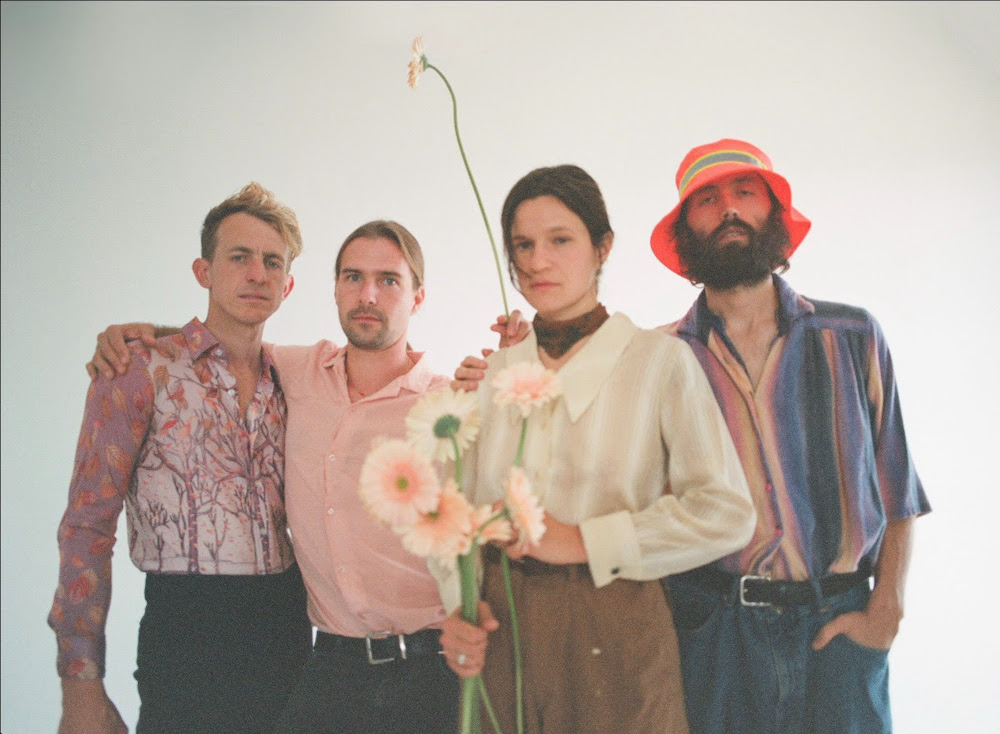In the best art, time folds in on itself, a visible line that connects the past, present and future, with the work forever shifting and transforming with our own and the creator’s evolution. Music thus isn’t just a document of a recorded moment, but a body that retains information and merges with the listener’s identity. The most exceptional music is that which manages to, somehow, retain hidden meaningful elements within its constructs, which – as the years pass – suddenly reveal themselves: small, borderline inaudible glimpses which carry their own stories. That’s why we identify with them – those moments stand parallel to the unspoken and unseen realities between where our heartbeats kick in.
To most, the stark line dividing Adrianne Lenker’s buzz cut hair might just be that: some ragtag reminder of brief harm. But the scar has its own story: at five years old, Lenker’s skull was cracked open in a domestic accident, almost ending her life. The image of the child’s head in her mother’s lap, the dishrag pressed to her head soaking up with blood, is reconfigured in the macabre and tender “Mythological Beauty”, recounted in first person.
It’s there where Lenker’s images reside, between beauty and the hideous, questioning identity and memory constantly at odds with themselves, yet accepting the contradictions that come with existence. During interviews, the singer takes long breaks, her gaze scanning the room, caught in a ray of light that hits an apple in the nearby fruit bowl or deep green in a particular plant’s leaf. Time seems to extend within her, space folds wide open. What she calls her “psychedelic thinking” on full display, she can find eternity in a grain of sand. “I’m not quite sure if I’m writing the songs from myself to my future child, or to my inner child, or from my mother to me,” she recounted in an interview with Pitchfork, perfectly encapsulating the unique qualities found in her songwriting. She’s reflecting the typical traits of – if you believe in such things – the Cancerian personality type of sensitive and emotional artist we were told was lost to time when the 70s died.
It would be easy to just reduce Big Thief to Lenker’s iconic genius, but the truth is that the group only works as a unit. Enriched by the talents of Buck Meek, Max Oleartchik and James Krivchenia, the four make all creative choices unanimously, move from place to place with each new session and use music as a dialogue.
With each new project, the group chooses a new geographical environment to record in, fashioning the music after their habitat, brazenly heading for unknown genre aesthetics and sonic experimentation. Their records could function as a road movie, reconnecting with Lenker’s experience of her family skipping places after being brought up in a religious cult. As a teenager, the songwriter would never stay long in one place, often living with different people or families all over the country. While the band’s first two albums reflected on autobiographical snapshots, Big Thief have since moved into more lyrical territory, catching poetic snapshots of things impossible to manifest: a ghost’s haunted presence in “Jenni”, the lovely smell of a difficult partner in “Wolf”, the loss of female innocence as observed by a father in “Interstate”, the cosmic desire for freedom in the void of endless time in “The Only Place”.
In Big Thief’s music – as in Lenker’s eyes – 10 seconds of silence, the brief feedback of a guitar, a sudden scream can hold eternity. But then, time moves on, the band leaves and finds a new place to record, their audience grow older. As time moves on, those moments amplify, unite with Lenker’s poetry and the sometimes celestial, other times earthy instrumentation, and become their own stories.
Presence and personality oozes out of every song this band has recorded, and the 30 chosen below could easily have included an armada of others, such as: “Animals”, “Cut my Hair”, “Haley”, “Velvet Ring”, “Certainty”, “Parallels”, “Flower of Blood”. But they don’t, and in the choices made, they reflect part of our staff, our own stories, which, at times, intersect with them. As a fellow Cancer with a tendency for head wounds, I can attest that what Lenker and her band has fashioned may be the best music of her generation. We witness the growth of a body into something larger than life, observing a legend in the making: never standing still, always in flux. – John Wohlmacher
Listen to a playlist of our top 30 Big Thief songs on Spotify
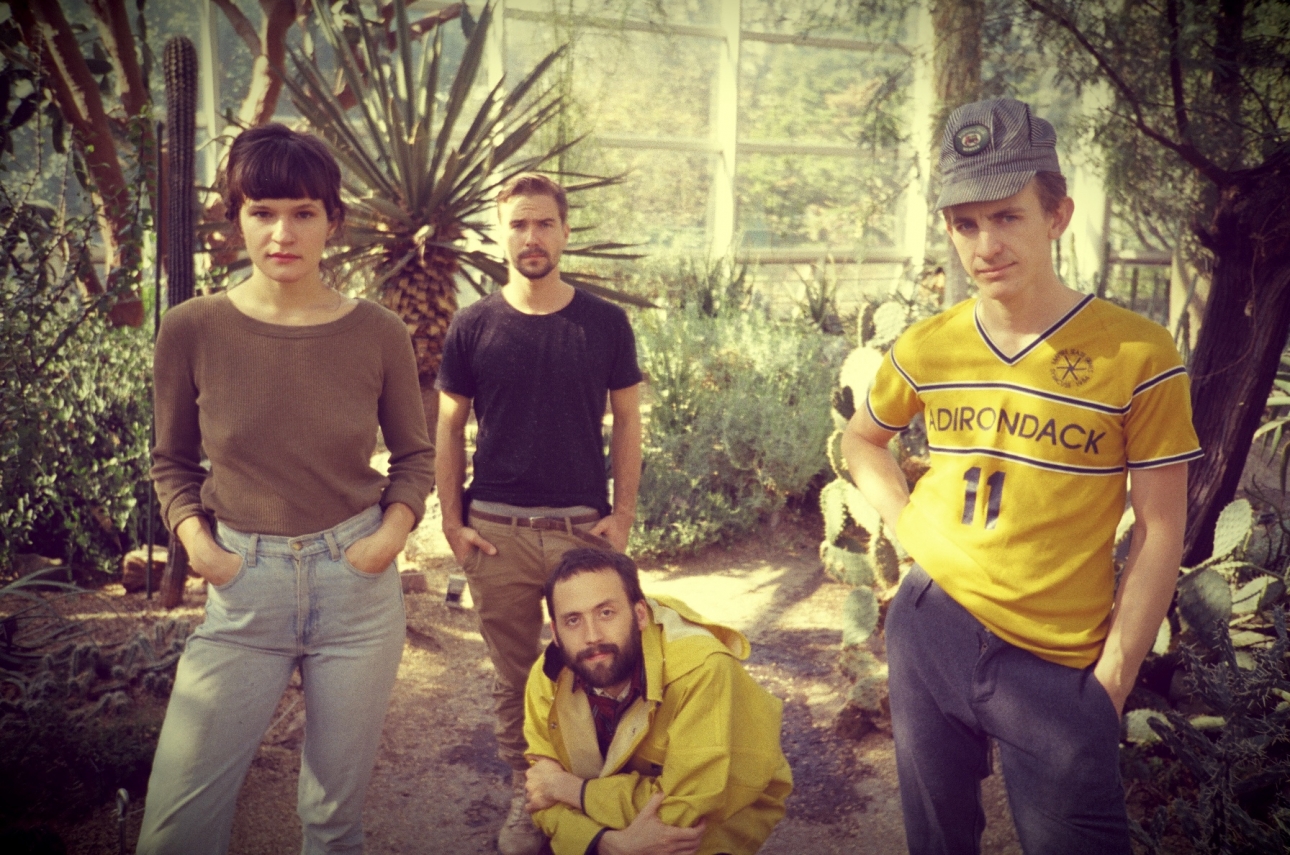
30. “Lorraine”
[Masterpiece, 2016]
Big Thief’s debut, Masterpiece, features the band mining various rock and alt-rock sources. Their inchoate folk leanings, however, are represented by such tracks as “Paul” and “Lorraine”, the latter of which unfolds like a two-minute singer-songwriter track, Adrianne Lenker’s voice supported by a basic acoustic guitar part. Her lyrics point to an affinity for impressionistic portraiture and poetically eccentric phrasing (“Your new blue eyeliner caught my distraction”). Her melody, though unflashy by pop standards, is sensual and immediately enrolling. Toward the end of the track, Lenker adds her own reverb-dabbed and compressed back-up vocal, the contrast between clean and modified sounds pointing to the sophisticated sonic paradoxes forged on and integral to later work, particularly Dragon New Warm Mountain I Believe in You. – John Amen
29. “Those Girls”
[Two Hands, 2019]
A particularly mysterious ballad on Two Hands, the nocturnal “Those Girls” returns to a sound familiar from The Beatles’ White Album. Recorded live, the track is of an intimate intensity, pushing the bass to the foreground and allowing Lenker a nakedly intense vocal performance. With eyes closed it almost feels like the listener is in the live presence of the band. This impression is further explored in the intimate lyrics to the track, which call for physical intimacy as shelter from the presence of something sinister.
It’s impossible to tell if the demons present here are inner or outer entities positioned in the past or future. The image of “those girls” is invoked, but never further explored past the ridicule and aggression they bring with them: “Island, demons / Zoë, you come over now / ‘Cause those girls keep telling me things / And only you can hold them down”. The lyrics are incredibly personal, yet manage to invoke a sense of longing that is universal. Ultimately, it doesn’t matter what haunts us – our desire to find somebody who can drown out those voices that hold us back always remains. Sometimes it’s the small things that become the most meaningful, just as a single soul can change who we are. – John Wohlmacher
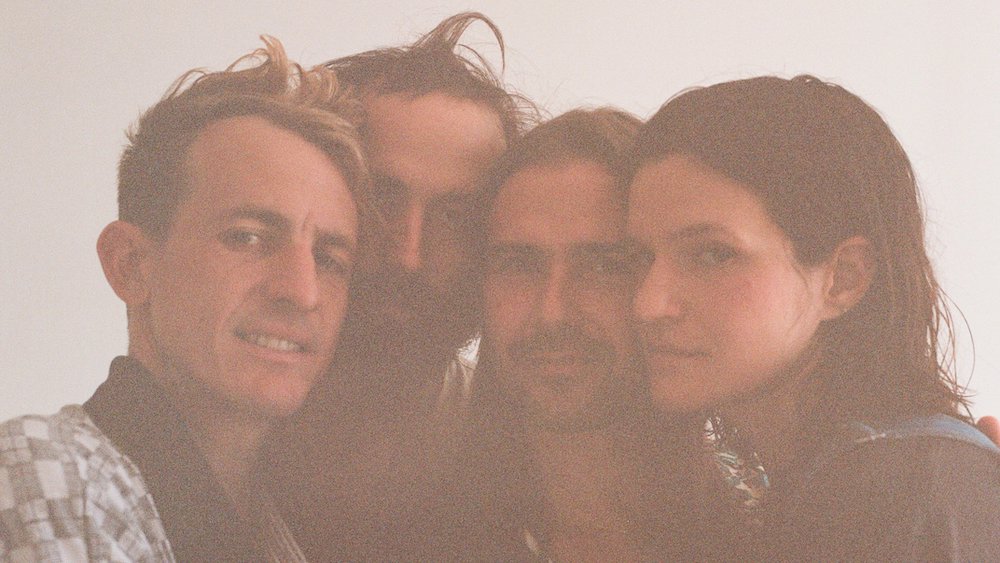
28. “Blurred View”
[Dragon New Warm Mountain I Believe In You, 2022]
With “Blurred View”, one of the more seamlessly eclectic tracks on Dragon New Warm Mountain I Believe in You, Big Thief draw, both instrumentally and in terms of production, from the dreampop, shoegaze, psychedelic-pop, and dark-folk genres/subgenres. Waves of drone-y, ambient, and fuzzy sounds unfurl as James Krivchenia’s drums slightly lag, giving the tune a languorous, summery, stoner feel. As the track progresses, the band merge ethereal atmospheres and disparate rhythms – Krivchenia segueing to jazzy patterns and playfully off-tempo accents – rendering a delicate yet mercurial mix. Adrianne Lenker’s voice sounds static-y, as if she’s singing through a walkie-talkie. Her hypnotic melody and oblique lyrics point to the fluid nature of identity; how, during heightened moments, one’s sense of separateness/selfness can recede or disappear, yielding an experience of transcendent and shimmering oneness. – John Amen
27. “Love Love Love”
[Dragon New Warm Mountain I Believe In You, 2022]
On “Love Love Love,” the 18th track on Dragon New Warm Mountain I Believe in You, a drone-y atmosphere and trashy drums set the song’s tone. Buck Meek’s guitar is seemingly run through various effects, yielding noisy yet hauntingly melodic blasts that occasionally sound as if they’re being produced by a modified trumpet or trombone. The overall mix is cacophonic yet integrated, lo-fi yet studied. “I already died / I’m singing from the other side,” Adrianne Lenker moans, her performance at once impenetrable and rivetingly intimate. Lyrically, she addresses the notion that at death the love that remained unexpressed during one’s life is perhaps freed, dissipated, absorbed by the cosmos. Evoking a sense of hope and redemption, the song also radiates anxiety mixed with exhilaration. – John Amen
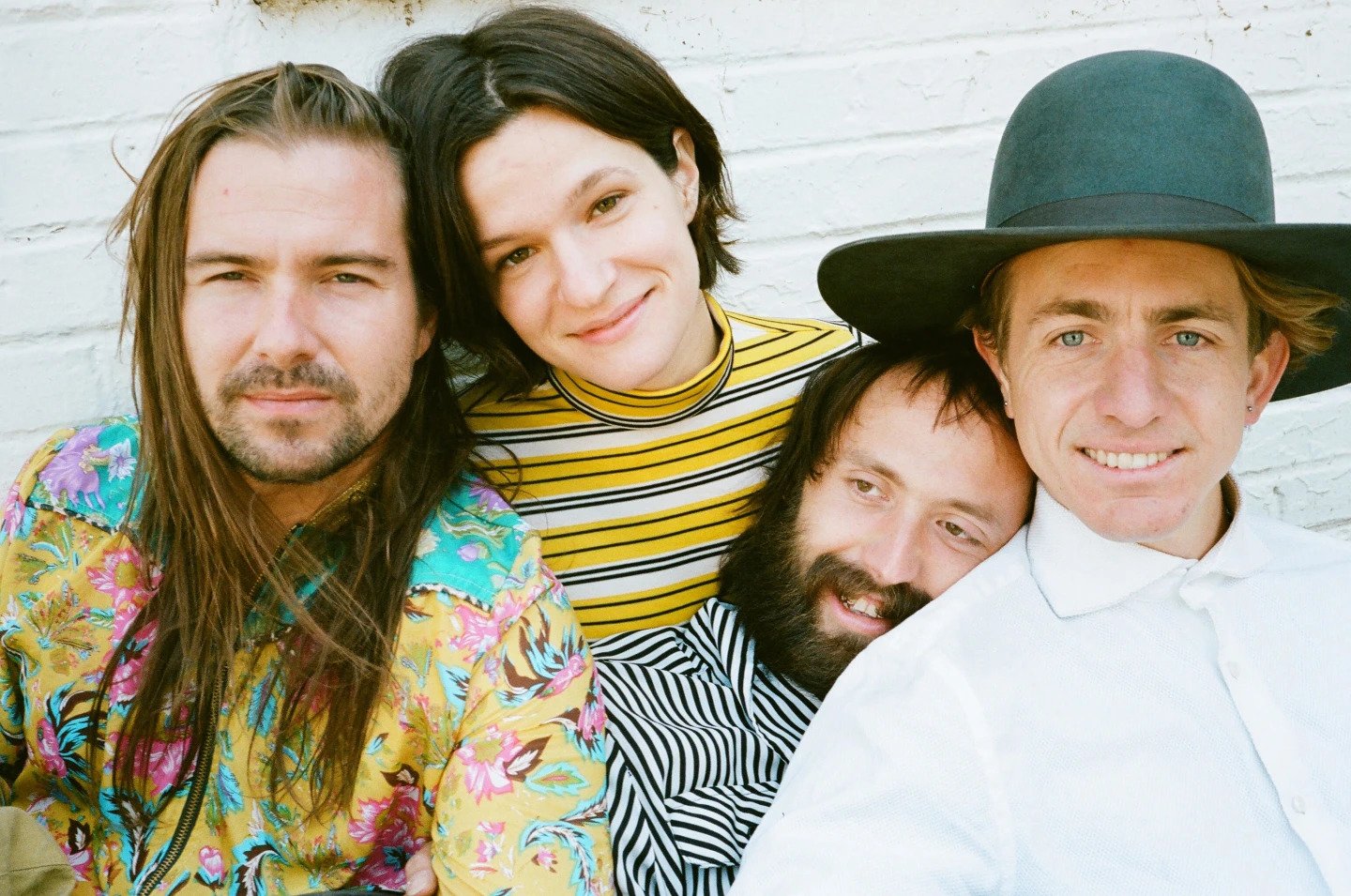
26. “From”
[U.F.O.F., 2019]
On her solo album abysskiss, Adrianne Lenker gave us a peek behind the curtain of a very talented songwriter. Away from her main band, Lenker gave us a set of solitary, quiet, lo-fi acoustic cuts, which were still full of the knotty melodies and indelible lyricism we had already come to know her for. In fact, some of these artistic assets were actually magnified in the quietude. One of the highlights of that album was “from”, a song full of domestic imagery of lying on a floor and repeated snapshots of a particularly oblivious and curious puppy, and an absolutely lovely melody.
Updated for the full band on Big Thief’s great U.F.O.F., the song retains its starkness while also blossoming into something a little darker and more fluid. The drums add a roiling, river-like undercurrent, and the song sways in and out from quiet to loud, echoing the unsteadiness of its lyrics. Lenker’s melody is intact and brighter, slinking through its imagistic sojourn to its potent ultimate lyric: “Baby’s coming soon / Wonder if she’ll know / Where she’s come from”. That last word rings out to the ether. The song is still a gentle organism, a quiet storm in the far away, but with her band’s loving additions, it elevates the song from the shadow into the dewy light. – Jeremy J. Fisette
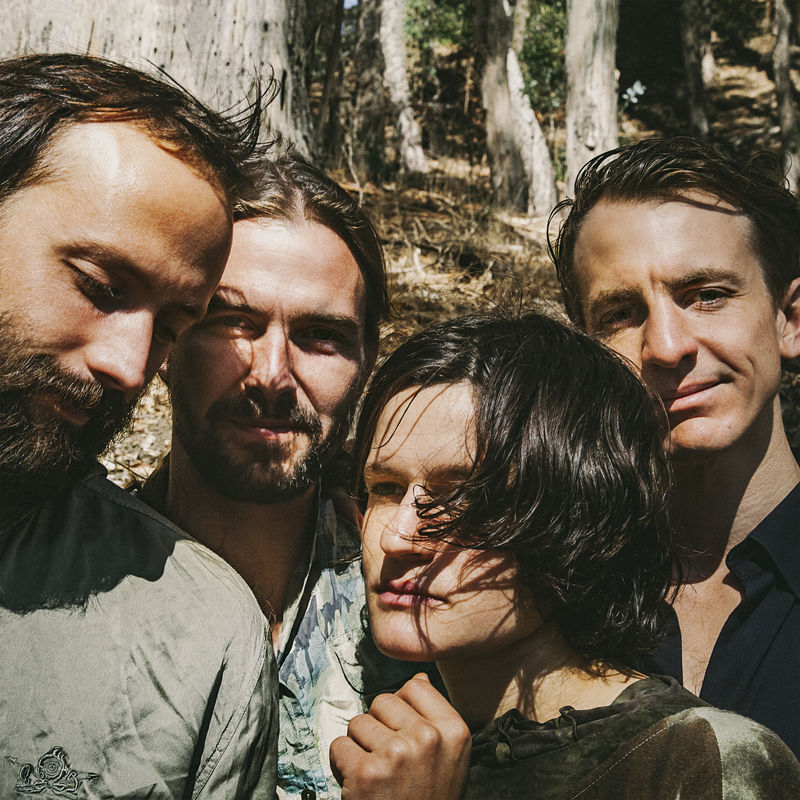
25. “Two Hands”
[Two Hands, 2019]
Big Thief described their fourth album, Two Hands, as an “earth” complement to the more psychedelic U.F.O.F.. While there are stylistic and tonal overlaps between the two albums, Two Hands does indeed lean toward a more terrestrial ambience. With the title song, for example, a swampy haze, as opposed to a reverb-created spaciness, pervades the track, evoking a humid, steamy feel. Adrianne Lenker’s vocal is draped atop Buck Meek’s hypnotic guitar and James Krivchenia’s lulling drum part, the track growing slightly cacophonous while remaining melodic, sultry, entrancing. Lenker’s voice is rife with existential longing while the instrumental mix swells and contracts, bringing to mind some mythic animal crawling through the subsoil. – John Amen

24. “Shark Smile”
[Capacity, 2017]
“Shark Smile” opens up with raucous guitar squalls and restless drums – the kind of opening that foretells the dark and ominous, one that would fit on a track by The Walkmen. Yet 40 seconds in, the noise drops; steady guitar strumming and drums enter, incessant in their rhythms. The song’s tragic story—an encounter with the seductive Evelyn, the subsequent road trip embarked at a reckless speed, the inevitable crash—is told by Lenker with great restraint. Her hushed vocals rise only at the song’s “woo”s, knowing anything more would distract from a song that carries the weight of a parable.
Yes, the squall returns and rises and falls throughout “Shark Smile”, like rain and wind battering a windshield, yet nothing truly deters the song’s focus. On future albums, Big Thief would push their ambitions to ever-rewarding ends, but five years ago, their chops as a more straightforward indie rock band were already among the strongest and most seductive around. “She said woo / Baby, take me”—I would, too. – Carlo Thomas
23. “Century”
[U.F.O.F., 2019]
One of Big Thief’s most understatedly sexy songs, Lenker displays her gift for atmosphere and setting on this story of mysterious romance. “Dog’s eyes in the headlights of the driveway / Cool autumn rain,” she begins as a misty acoustic strum and pitter patter rhythm describe the drive through the light downpour. Lenker plays the waiting mistress, working herself up for passion; “Bugs died on your windshield on the freeway / Wonder if you’ll be the same.” When her partner does arrive, the connection between the two bodies is quietly electric, and Big Thief keep it sauntering as she suggests “there’s something that I want you to know / turn on the shower.” At that point, the two lovers lock eyes, Buck Meek’s voice drops in to play the partner and they sing to each other: “we have the same power.” It’s the ultimate signal that the outside world no longer exists, all that matters is pleasure in the moment, and they have the power to give it to each other – consequences be damned. – Rob Hakimian
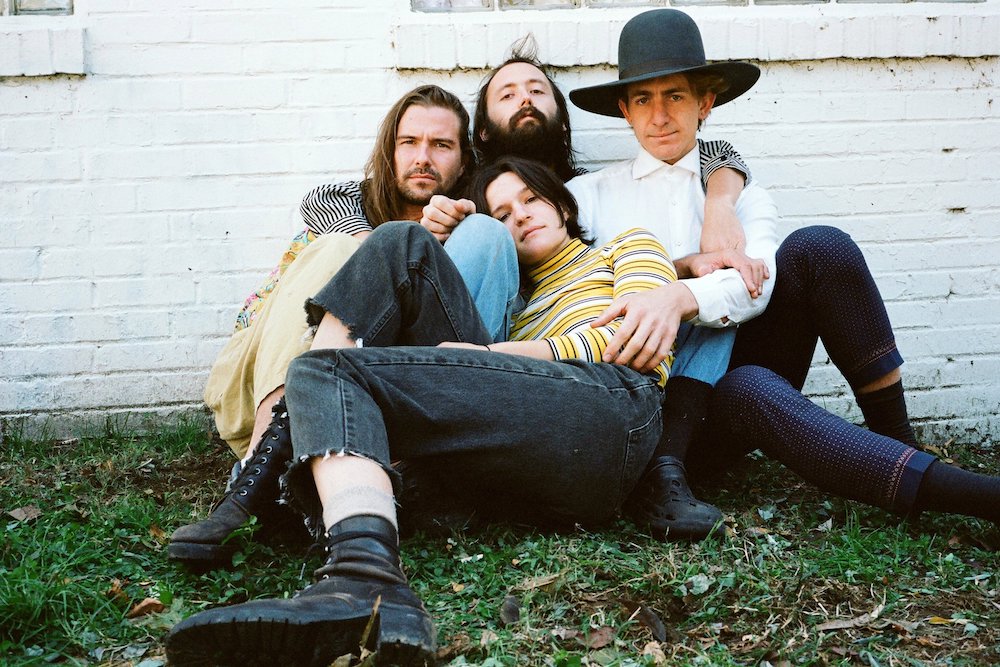
22. “Open Desert”
[U.F.O.F., 2019]
In its most glorious moments, U.F.O.F.’s shimmering soundscapes form the gestalt of a new Souvlaki: a nocturnal yet shimmering, brittle yet robust crystalline structure – a dream caught in ice. No image encapsulates that better than Lenker’s suggestion of lips kissing water, repeatedly appearing on the band’s third album, but most poetically on “Open Desert”: “To the poison image / Brave surrender / Kiss the water”. The song invokes a dreamlike stasis caught in everyday magic: white light leaking through the crack in a door, two differently coloured eyes, the reflection of a mirror. Lyrically, it’s one of Lenker’s most elusive songs: the notable loss of teeth and blood suggests themes of ageing and mortality, the change from living room to waiting room as origin of the “white light” that comes through the door suggesting health struggles. The obscured meaning of the lyrics seems intentional, suggesting dream like states and emotional responses to single images dreamt or lived which.
The image of a child being drawn to the light shining from underneath a door, towards another unknown world, is a great metaphor for a quest of knowledge (something Lenker also dealt with recently in “Sparrow”), and the entity which “has one green, one eye blue” invokes a strange, transgressive light bringer the likes of Fanny & Alexander’s Ismael, revealing itself through small moments of beauty after a great period of pain to deliver something transcendental – the “things we’re meant to understand”. The song’s greatest trick is that it manages to encapsulate this feeling sonically, in the quiet, high ambient notes that arrive periodically, like morning light shining through a window, and transport the song – and listener – into celestial spheres. There’s something sacred here, something precious, which words can’t describe. – John Wohlmacher
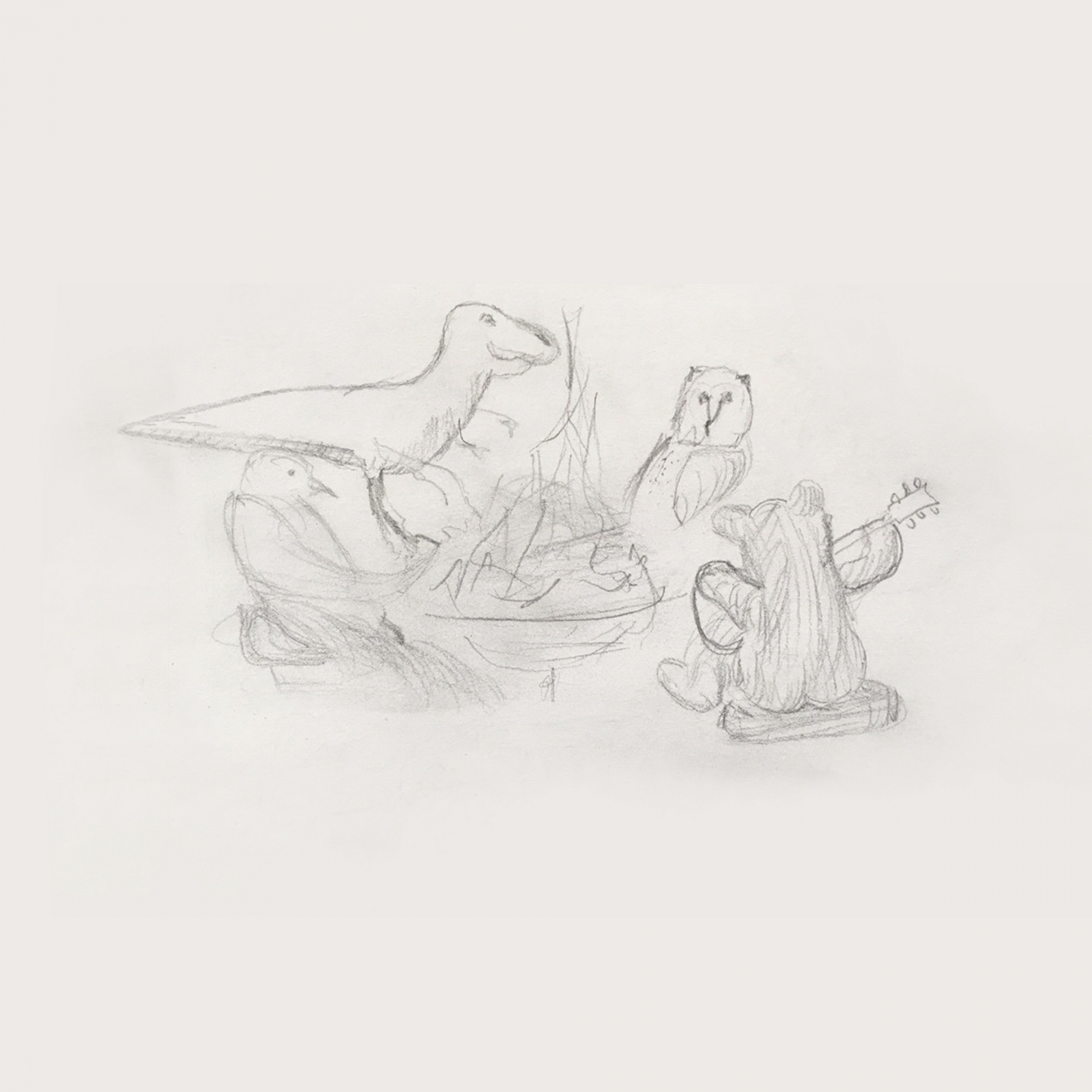
21. “Dragon New Warm Mountain I Believe In You”
[Dragon New Warm Mountain I Believe In You, 2022]
Big Thief created multiple versions of “Dragon New Warm Mountain I Believe In You”, and those who have seen them live recently can attest to how awesome the HEAVY rendition is – but the album recording will always be the definitive version. Recorded during the third Dragon New Warm Mountain session high in the Colorado Rockies, you can hear the surroundings seeping into the sound of the track, and Big Thief reciprocating with pure inspiration.
“There’s a dragon in thе phone line / Coughing up a mighty flame / With a tonguе of silver / Calling out my oldest name,” Lenker sings; the “dragon” in question could be a lover, it could be nature, it could be music – but I like to think it’s Big Thief the band (bassist Max Oleartchik has compared playing in the quartet to riding a dragon). Lenker sings her heartfelt belief out into the brisk, bright atmosphere of the song, which seems to mirror the elemental sweep of their mountainous surroundings.
Big Thief pay her back with a deceptively deft arrangement that features gliding acoustic, delicately sputtering drums, whispers of brass and the crackle of icicles just to top it off. “Dragon New Warm Mountain I Believe In You” is transportive, spiritual, beautiful and the sound of one of the best bands in the world absolutely in their creative element. “It’s a little bit of magic.” – Rob Hakimian
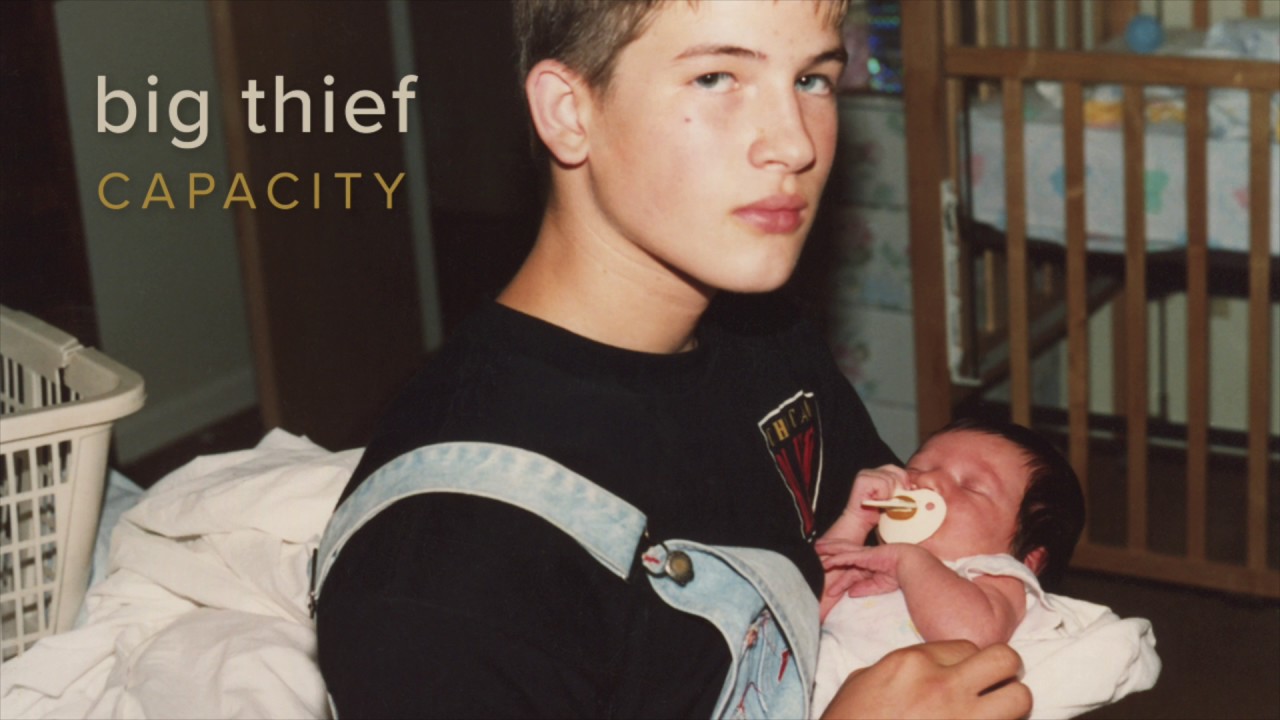
20. “Black Diamonds”
[Capacity, 2017]
One of the most complex and heartfelt love songs ever written, “Black Diamonds” is a gentle study of the physical and spiritual dance of falling in love. On the musical side, it’s a dialogue between the guitars of Meek and Lenker, which seem to cautiously explore the room between them, one taking the lead and the other responding, roles alternating, while the rhythm section provides steady heartbeats which, in significant moments, rise and drop. It’s one of the band’s most expressive guitar tracks in how it uses tender playing to simulate the exchange of two lovers.
Vocally, it’s one of Lenker’s earliest masterpieces. Her assured voice is rich with longing, but never rising into loudness. Listening to a lover’s lead, she finds herself lost in the vast blackness of his eyes, but resolutely stands her ground. At the start of the song, she positions herself as a fragile and shy person (“So much coming in / I do not know where to begin / I just follow the lead you’re pulling”), but grows throughout the progression of the track to come out all the stronger. Early on she asks “Should I let you make a woman of me? / Should I let you take the mystery from me? / See the inside of my room at night?” – by the end, that transformed to “Come on, let me make a man outta you / I could gather you and you tell the truth / You could cry inside my arms”.
The struggle of Lenker wrestling with societal roles and female stereotypes – the disappearance in a male lover’s hurricane – is thoughtful and illuminates her loving in a suggestively tender way. “Black Diamonds” characterizes the anxiety of what love reveals, the depth it can lead to, but also how it empowers us to be more than what other people see when they encounter our body. The eyes, all window of the soul, are black and deep and dark, sparkling manifold with the potential and excitement of laboured breath and quickened heartbeat. – John Wohlmacher
19. “Shoulders”
[Two Hands, 2019]
Two Hands, the “earth twin” to the celestial U.F.O.F., is fairly often misunderstood – as a simple rock album, as the group’s most ramshackle record, as their most obvious. But leave it to the quartet to defy all expectations once the surface layers are removed, and it includes some of the band’s most emotionally resonant work. “Shoulders” is one of the album’s most alluring trojan horses: a grunge-infused ballad often interpreted as a call-to-arms against climate change, the song is characterized by dichotomies and double meaning. It starts out with a uplifting Neil-Young’ish riff, which disintegrates halfway through to give way to Lenker begging “Please wake up”.
In Big Thief’s most recent work, there’s repeated suggestions of drug usage and its destructive effect on people. The powerful chorus “They found you in the morning / The blood was on your shoulders / They found you at the corner / Your head was doubled over” contrasts the verses, which frame the subject Lenker addresses as a sort of healer, who in turn destroys themselves, as suggested by being unable to wake up.
What makes it all the more painful is the climax of the chorus – and the entire song, when Lenker’s voice rises to yelling “And the blood of the man / Who killed my mother with his hands / Is in me, it’s in me, in my veins”. Those lines are often attributed to characterize domestic violence or the symbolical motherhood of the planet Earth, but it also poignantly characterizes how self-destruction is something within our very identity, how we are looking for moments of quiet peace and healing relief in slumber-like states, only to realize it chokes us. That can be a violent partner, humanity’s disregard for its planet or our own inability to heal without intoxicating the pain away – the most powerful lines are always the most universal. – John Wohlmacher
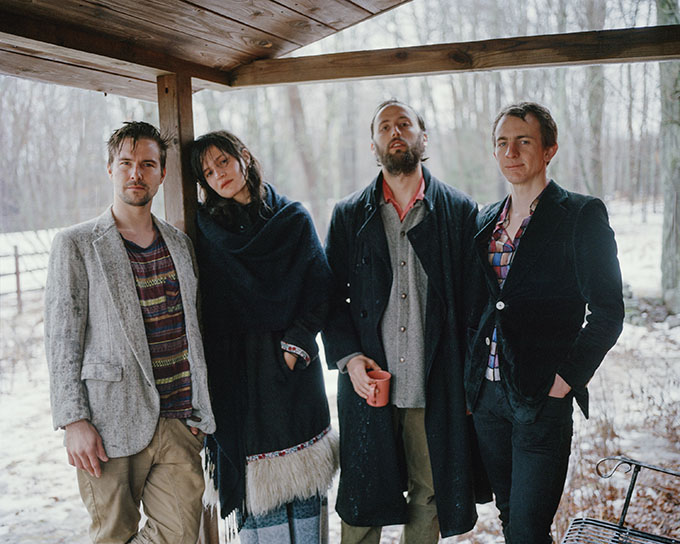
18. “Real Love”
[Masterpiece, 2016]
From the outside, Big Thief seem like a band of peaceful people spreading love and harmony, but those of us in the know are aware of just how much darkness and blood lurks in their music. That has existed since their earliest days, and “Real Love”, from their debut album, is one of their most violent – there’s no magic or mysticism here, just pure human jealousy and pig-headedness.
Told from the perspective of a child viewing their mother being abused by their father, the child has no other way to understand the smacks, split lips and tears other than to attribute them to “Real Love”. Of course, sung by the adult Lenker, the result is a lot more tumultuous and painful, and Big Thief roll out one of the loudest and most undulating rockers in their catalogue to fully express the depths of pain and regret that exist behind her voice and eyes. Despite the darkness, it remains one of their most powerful tributes to the power that “love” has to make humans do insensitive and irrational things. – Rob Hakimian

17. “Jenni”
[U.F.O.F., 2019]
One year ago, I witnessed a ghost. In the middle of the night, awake and in thought, I heard a woman’s voice scream into my ear, twice.
I found myself cowering in a corner, shivering, in total disbelief. I have had spats with the paranomal before, witnessed occult and arcane manifestations, but this? There’s nothing to prepare you for the sheer disbelief and fear in witnessing something this sudden, which should not exist, according to what we’ve been told. Because within this experience is a more than just the rationale there could be an afterlife: it means that our sense of security, no matter if spatial, mental or philosophical, is a ruse, and what rules natural sciences dictate to us – that there is no such thing as a ghost – is a lie!
“Jenni” captures this cosmic sense of anxiety and disintegration perfectly. It’s unclear if Lenker was inspired by witnessing a spectral entity (given her origin story – growing up in a cult and then living across the country in all kind of strange locales – it might well be), but there is something unholy and intuitive to the track that oozes familiarity. The lyrics remain a fragmentary mantra (“Too hot to breathe” – “Her vacant eye” – “Jenni’s in my room”), which Lenker almost whispers, an eerie childlike disbelief that later on transforms into almost erotic observations of translucent skin and opening portals, materializing a sense of occult sisterhood. A palpable sense of violence and distress permeates the lyrics and while the meaning remains obscure, it’s certain Jenni is not at rest. Small moments of sonics, feedback and effects cut through the structure of the song, announcing a presence beyond that of the band.
At times it seems like the séance that marks the cataclysmic event of John Lennon’s “Cry Baby Cry”. And then “Jenni” all of a sudden climaxes in a single repeated guitar note, played over and over, finally exploding into an eerie, monstrous yelping during the last chorus. It could be the band members yelling, it could be guitar effects, or it could be Jenni herself, announcing herself. She could reveal herself to you when you least expect it. She could be behind you right now, a memory or an echo of something we all know exists, yet tell ourselves is just a story. – John Wohlmacher

16. “Time Escaping”
[Dragon New Warm Mountain I Believe In You, 2022]
One of the most appealing elements of DNWMIBIY is the sense of fun. “Time Escaping”, the album’s second track, envelopes listeners with hollow drums, chirping synths, and enchanting flute. “To hit the stage and blush wild, laughingly / Crush the rage and rush time tappingly,” go the first two lines, with Lenker delivering them in a slow yet bouncing cadence. In their mystery, Lenker gets at the childhood fascination of realizing the connection of everything.
As we grow older, it’s easy to let cynicism take hold, to let our experiences codify our worldviews. Yet “Time Escaping” resists this impulse; the song rolls along with Lenker picking up observations and putting them in her pockets like dandelions or ladybugs. “Time Escaping” reminds listeners that discovery is part of what makes life worth living. And for Big Thief, their vehicle for discovery has never been so fully realized—it’s music. It’s music. – Carlo Thomas
15. “Change”
[Dragon New Warm Mountain I Believe In You, 2022]
The opening track to Big Thief’s latest album sets a mood of old-timey folk, reminiscent of Bob Dylan, Peter Paul and Marry and other such acts. While the New York City outfit completely pulls off this style and Adrianne Lenker’s vocals have the timbre of a 60s great, there is more depth to “Change” than just an inviting sound.
The song lyrics describe transformation, inconspicuously cueing up what the rest of the album is going to be like — ever-changing and evolving. Lenker also ponders existence, emotions, static and motion, the importance of life, but she does it ever so weightlessly and courageously. – Aleksandr Smirnov

14. “Mythological Beauty”
[Capacity, 2017]
Compassion. “Mythological Beauty” is the distillation thereof. Over a steady stomping beat and dreamy folk backing, Adrianne Lenker tells the tale of her mother becoming impregnated at 17 (“Seventeen, you took his cum / And you gave birth to your first life”) and giving the baby up for adoption because she was too young to take on the responsibility. “I have an older brother I don’t know, he could be anywhere,” Lenker reflects – with wonder, rather than judgement.
Despite the harrowing past, her mother still went on and had Adrianne and her sister – only for the child Adrianne to have a serious accident while playing in the garden. “You held me in the backseat with a dishrag / Soaking up blood with your eye / I was just five and you were 27 / Praying ‘please don’t let my baby die’,” Lenker sings, her voice reaching a pitch that reflects the fraughtness of the moment. We travel back in time with the singer as she melds into her mother’s mindset and fully understands the pressure and horror, accepting it with loving clarity.
Despite telling these heavy histories, and her mother being “all caught up inside”, Big Thief let us know that Adrianne’s mother has to this day lived her life generously, honestly, and lovingly: no wonder she’s the “Mythological Beauty”. – Rob Hakimian

13. “Little Things”
[Dragon New Warm Mountain I Believe In You, 2022]
When “Little Things” dropped in summer 2021, it felt at once warm and a little painful. Lenker’s acoustic guitar strums glisten while Meek’s electric guitar cuts offer an element of distortion, like when you stand up too fast and suddenly feel a bit dizzy. Or, in keeping with the song’s theme, when you lose your breath at the sight of your love.
“Little Things” captures and condenses this particular spectrum of emotions brought on by love. Lenker’s lyrics offer adoration for her love: “New York City is a crowded place / I still lose sight of every other face.” Yet her emotions flip upside down just a few seconds later: “Maybe I’m a little obsessed / Maybe you do use me.” After Lenker’s voice falls away—“Where are you?” goes the final line—the song rolls on, incessant on its glistening tenderness. On an album where every song is a highlight, “Little Things” derives its power from vulnerability, from knowing that nothing is certain but giving your best shot anyways. – Carlo Thomas
12. “Spud Infinity”
[Dragon New Warm Mountain I Believe In You, 2022]
Potatoes — they’re versatile — you can cook them fried, mashed, or scalloped (to name a few). But who knew you could make a damn bop about one. Big Thief can do more than pull at your heartstrings; they can pull you into the corral for a rootin’ tootin’ good time, that’s for sure. These folk-country-bluegrass cosmologists have offered a few foot-stompers throughout their quickly growing discography, but none will get you going like “Spud Infinity”. A fan favorite long before its official studio release, “Spud Infinity” is a communal ditty — twangy but deeply felt bluegrass with a spirit to break free. Sure, some of the lyrics are absurd, but its message of accepting yourself or “the alien you’ve rejected in your own heart” will have a few tears falling down and into your dusty cowboy boot as you two-step alongside other outsiders. – Kyle Kohner

11. “Forgotten Eyes”
[Two Hands, 2019]
Big Thief explore dark themes in a lot of their songs, but “Forgotten Eyes” is so loving that it’s almost deserving of a humanitarian award. No, it doesn’t have any “We Are the World”-level cheesiness, but the chorus of “Everybody needs a home and deserves protection” almost makes me blush. It’s woven into an exploration of the communal as corporeal: descriptions of our “collective arm”; “the cheek with which we smile”. Ultimately, Adrianne’s observations on “Forgotten Eyes” are an appeal to kindness: “Forgotten tongue is the language of love,” she concludes. No doubt. – Ethan Reis

10. “Paul”
[Masterpiece, 2016]
For a band that has no bad songs, it’s not easy to agree on their best work. But “Paul” is probably the most popular Big Thief song, and not for nothing: its late-nite, almost 50s pop vibe is as comforting as anything they’ve done. If the chorus sounds like something a new band would save for the centerpiece of their debut album, it’s probably because that’s exactly what it is – I’ve seen it turn a room’s Covid-anxious crowd into smiling singers. Despite its near cheat-code level of accessibility, I don’t see how it can be left out of a discussion of their greatest achievements thus far. – Ethan Reis

9. “UFOF”
[U.F.O.F., 2019]
With their third album, Big Thief fully embrace their Appalachian/Americana leanings while, on the production end, continuing to explore evocative textures and ambient instrumentation. With the title track, “UFOF”, the band find a fertile balance between psychedelic atmospherics, lullingly transportive rhythms, and classic folk underpinnings (acoustic guitars, shuffling drum beat, contained but ear-catching bass part). Adrianne Lenker’s languorous voice, sensual melody, and poetically free-flowing lyrics (about saying goodbye to her “UFO friend”) are bolstered by understated yet emotionally complex instrumental interplays, dynamics that are seminally honed on Dragon New Warm Mountain I Believe in You. – John Amen

8. “Mary”
[Capacity, 2017]
As a lyricist, Adrianne Lenker can be direct, mysterious, bloodthirsty and romantic, but she’s never been as childishly whimsical as she is on “Mary”. The luminous torch song features one of her most lucid visions of love ever. It may be full of unusual, incomprehensible metaphors, but when listening to “Mary” we seem to understand every word she says; it expresses a dizzying love that’s truly beyond words and is more about visceral happiness. When Big Thief play “Mary” live, you can hear a whole audience chant along to the pagan poetry, living on every word; “Oh and, heavens, when you looked at me / Your eyes were like machinery / Your hands were making artifacts in the corner of my mind.”
On record, the band provide a wan soundscape of piano chords and synths echoing beneath her tumbling words like lights reflecting off a lake, expressing the infinitude of feeling – the desperation for the moment to last forever. Of course, no passion is eternal, and there’s a pang of pain amidst the beauty as Lenker envisions the future; “And I know that someday soon I’ll see you / But now you’re out of sight / And you’ll kiss me like you used to in the January night”. Lenker wants to dwell in this moment alongside her lover for as long as she can, and with this little bit of musical magic she’s preserved it forever. – Rob Hakimian
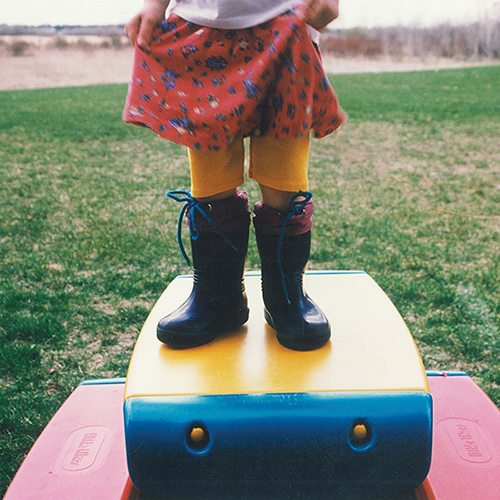
7. “Masterpiece”
[Masterpiece, 2016]
It’s probably a good thing that you can’t smell songs (yet), but if you’ve been to any hole-in-the-wall bar (like, ever), then you can relate to Adrienne’s memorable appeal on “Masterpiece”: “This place smells like piss and beer / Can you get me outta here?” Much like “Change” would five years later, “Masterpiece” describes a kind of lover’s déjà vu: “She looked a lot like me”, and “She looks a lot like you” – these visions conclude in a Lucinda Williams-like observation: “There’s only so much lettin’ go you can ask someone to do”. When you pair this poetry with a catchy melody and beautiful harmonies, it’s no wonder that “Masterpiece” became a title-track and a Big Thief classic. – Ethan Reis

6. “Orange”
[U.F.O.F., 2019]
On U.F.O.F., an album that evokes the otherworldly at almost every turn, “Orange” lies nestled halfway through the tracklist. The song consists of Lenker’s guitar and her words, delivered with a mourning listeners can feel in their guts. “She tells me to close and count to ten,” Lenker sings, a lines that implies both trust and betrayal. On “Orange,” Lenker recognizes that a lover’s disappearance can leave one at a loss for answers and, perhaps more consequential, a desire to rewrite the past (“Can I close and open once again?”)
On “Orange,” Lenker’s songwriting isn’t much different from the rest of her work. She blends a deeply personal perspective with poetic imagery “Hound dogs crowing at the stars above / Pigeons fall like snowflakes at the border.” Yet rarely are the weight of her words—her pain, her bewilderment at where she’s found herself—so palatable. “Orange” serves as a reminder that no matter the sonic palette wielded, Lenker’s words are often the true source of Big Thief’s power. – Carlo Thomas
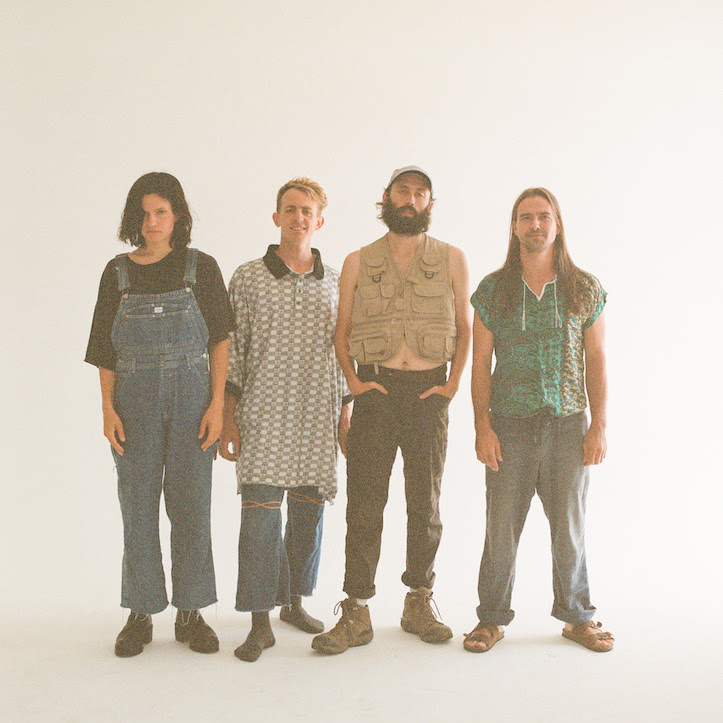
5. “Sparrow”
[Dragon New Warm Mountain I Believe In You, 2022]
Adrianne Lenker has long excelled at making the most simple things feel devastating, the most intimate of statements feel grand. “Sparrow” achieves both. Blending a story of deep personal pain with the story of Adam and Eve, in each given moment you’re not certain where to turn, where exactly she’s leading. With a grave, cyclical delivery, Lenker gradually layers her vocals, creating a devastating maw of loss and hopes dashed, letting the drama ramp up with. “she has the poison inside her / she talks to snakes, and they guide her,” she sings in a way that somehow manages to be truly eerie, saddening, and ridiculously catchy all at once. It’s impossible not to feel all; the loss of innocence, men’s ever-encroaching desire for control over women’s bodies. It’s a spare song that says more than meets the ear. In other words, it’s primal, essential Big Thief. – Chase McMullen

4. “Cattails”
[U.F.O.F., 2019]
Written by Lenker on an inspired morning at the rural Bear Creek studio in Washington, surrounded by pine trees, “Cattails” is a song that captures the wonder of nature and being alive in all its diverse glory. The recording of the song happened almost instantaneously as it was written, Dom Monks setting up microphones around the songwriter as she fumbled through the tripping words, Krivchenia drumming along, until she nailed it. The final version maintains that organic quality; you can feel a fresh breeze in your hair as you listen, the titular reeds swaying along to the 12-string guitar in your mind’s eye.
Lyrically, it finds Lenker circling the many mundane and mystical wonders of existence and ageing, shifting from the supernatural (“meteor shower at the motel”) to the characterful (“middle of the river in your lawn chair”), wrapping it all up with the perfectly-pitched pleasure-pain hook “you don’t even know why when you cry”. Everything about “Cattails” works so perfectly in unison, Lenker’s words tumbling across the irrepressible arrangement, that it builds up a ball of emotional energy. By the time of the resounding finale, with hiccupping piano keys dancing just beneath the sparkling surface, you can’t help but feel uplifted to a place of spiritual happiness at simply being alive. – Rob Hakimian
3. “Contact”
[U.F.O.F., 2019]
It’s fascinating to watch Adriane Lenker being silent. In interviews, she lets her gaze wander, takes long breaks to collect herself before a response, is distracted by brief details in the room. She calls this her “psychedelic thinking”, wandering through ideas and experiences. It’s, unsurprisingly, very cancer. “Contact” is meant to catch this strange state, which Lenker describes as follows: “It’s about my own story about swirling around in this kind of numb state, which is something that I’ve battled with since I was a kid. Like, you’re under water and you’re not even aware that you’re under water for a while, and then suddenly you realize you can’t hear or see or feel anything. You can kind of see the light at the surface and then suddenly you’re like, ‘Wait no, no, no, I can’t slip away. I need to feel. I need to be alive. I need to be connected.”
It envelops many of Lenker’s favourite themes – water, which is liberating but also scary; motherhood, which is both nurturing (“Wrap me in silk / I want to drink your milk”) but also sinister (“She gives me gills / Helps me forgive the pills”); dreams as escape from our physical from but also prison of our minds. All this spirals, quietly, in a deeply mysterious atmosphere, before all of a sudden, the song freezes for one seconds, and the screaming starts. Over and over again, Lenker screams, at the top of her lungs, over a solemn Grunge riff. It’s an intensely powerful experience to hear the song for the first time, be drawn in by the marine images of fishes, gills and water, only to be reminded of the very real and human body. Lenker describes it as that moment when we break out from that slipping away, that sinking, breaking through the surface, “feeling everything”. It’s a wake-up siren, right at the beginning, announcing U.F.O.F. and Big Thief with an explosion of pure, unbridled emotion. – John Wohlmacher
2. “Simulation Swarm”
There really are not very many songs that emotionally cut very deep and yet are very catchy on the surface. On “Simulation Swarm”, Lenker delivers what seems to be a futurist portrayal of life in digital world (possibly a simulation) and how alienation devolves into aggression, which creates only one desire — to retreat. Then it diverts into a meditation on personal loss and how relationships must be mended before they are buried forever. There is hope, there is a river of light and there is music. I leave you with this one thought from “Simulation Swarm” that does not even need the context to be understood and felt by most anyone: “I’d fly to you tomorrow, I’m not fighting in this war / I wanna drop my arms and take your arms / And walk you to the shore.” – Aleksandr Smirnov

1. “Not”
[Two Hands, 2019]
Barebones rock and roll has always been an essential thread woven into Big Thief’s magical musical cloak of disheveled, raw beauty. Never have they displayed this more viscerally than through “Not”, arguably the pinnacle of Two Hands.
A noise rocker epic of pure emotional release, “Not” is undeniably the band’s loudest moment to date. With a slow, goosebump-inducing folk-rock crawl moving the track’s first two minutes forward, Lenker gradually smolders into a fiery ball ready to combust. And when she does, listeners are overcome with the realization this is one of the band’s defining moments, both on the grounds of emotion and musicality, which is truly one and the same for Big Thief. Amidst a shroud of noise catalyzed by pummeling drums and churning guitar distortion, Lenker reckons with a painful past, wailing while repainting tiny but profound mementos that define this agony. Though she renders them non-existent, Lenker briefly gives life to these intimate images of bleeding blood, warm dew, and spine tattoos by sheer recognition. But she is quick to expel them from memory with the extinguishing power of her anguished scowl. – Kyle Kohner
Listen to a playlist of our top 30 Big Thief songs on Spotify

